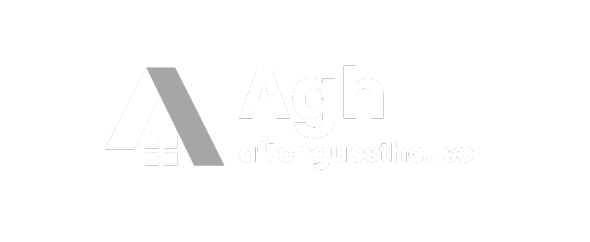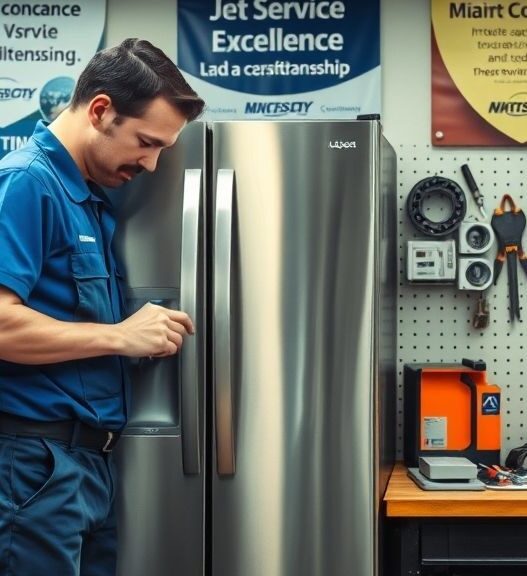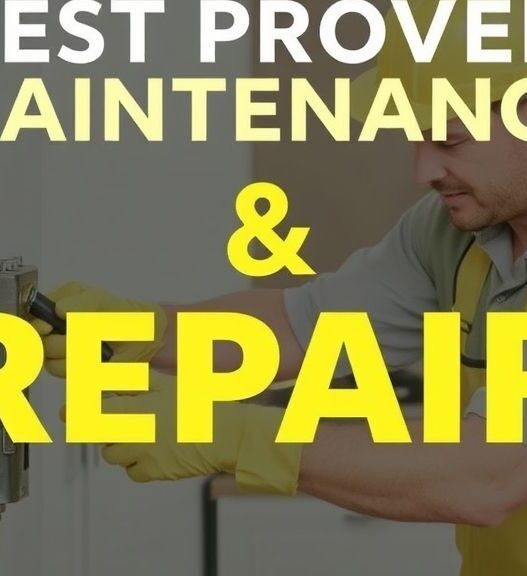Best Maintenance & Repair Guide VA Beach: Proven Tips
Owning a home in Virginia Beach is a wonderful experience. The coastal lifestyle offers unique joys. However, it also brings specific challenges for home upkeep. Regular home maintenance and repair are crucial. They protect your investment. They ensure your family’s comfort and safety. Ignoring small issues can lead to big problems. These problems often cost much more to fix later. This guide provides proven tips. It helps you manage your home’s needs. You will learn how to keep your Virginia Beach property in top shape. Proactive maintenance saves you money. It also gives you peace of mind.
This comprehensive guide covers essential aspects. We will discuss planning your maintenance tasks. We will analyze potential costs. You will find a step-by-step DIY section. We also offer long-term care strategies. Our goal is to empower you. You can confidently handle your home’s maintenance and repair needs. Let’s dive into keeping your Virginia Beach home beautiful and functional.
Planning
Effective planning is the cornerstone of good home maintenance. It helps you stay organized. It prevents unexpected issues. A well-thought-out plan ensures nothing is overlooked. It also helps you budget your time and money. Start by creating a yearly calendar. Mark down seasonal tasks. Include routine checks. This proactive approach makes maintenance less daunting. It turns it into a manageable process. Consider the unique climate of Virginia Beach. Salt air and humidity can affect your home. Plan for these specific challenges. Regular inspections are key. They help you catch problems early. Early detection simplifies any necessary maintenance and repair work.
Key Considerations
- Seasonal Checks: Adjust your maintenance schedule for each season. Spring is ideal for outdoor checks. Fall is perfect for preparing for winter. Summer requires attention to cooling systems. Winter needs focus on heating and insulation.
- Budget Allocation: Set aside funds specifically for home maintenance. Unexpected repairs can be costly. A dedicated budget helps you manage these expenses. It prevents financial strain. This is a vital part of any home maintenance and repair strategy.
- Tool Inventory: Keep a well-stocked toolbox. Basic tools are essential for small fixes. Ensure you have a hammer, screwdrivers, and a tape measure. A good set of tools makes DIY tasks easier. It saves you time and money.
- Professional Help: Know when to call an expert. Some tasks require specialized skills. Electrical work or major plumbing often need professionals. Do not attempt jobs beyond your skill level. This ensures safety and proper completion.
- Documentation: Keep records of all maintenance and repair work. Note dates, costs, and contractors used. This documentation is useful for future reference. It can also be valuable if you sell your home.
Careful planning reduces stress. It extends the life of your home. It protects your investment in Virginia Beach. A solid plan is your best defense against major home issues. It makes home ownership more enjoyable.
Cost Analysis
Understanding the potential costs of home maintenance is crucial. It allows for better financial preparation. Prices for maintenance and repair services vary. They depend on the task’s complexity. They also depend on the materials needed. Location also plays a role. In Virginia Beach, labor costs can differ. Always get multiple quotes for larger jobs. This helps you compare prices. It ensures you get a fair deal. Remember that preventative maintenance often saves money. Addressing small issues early avoids expensive major repairs. A leaky faucet is cheap to fix. Water damage from a long-term leak is very costly. Invest in regular upkeep. It is a smart financial decision for your home.
Price Comparison
Here is a general overview of common maintenance and repair costs. These are estimates. Actual prices may vary. Always consult local professionals for exact quotes. This table helps you budget for typical home needs in Virginia Beach.
| Service/Task | DIY Estimated Cost | Professional Estimated Cost | Frequency |
|---|---|---|---|
| HVAC Filter Replacement | $10 – $30 (filter cost) | $75 – $150 (part of service) | Every 1-3 months |
| Gutter Cleaning | $0 (if you have tools) | $100 – $250 | Twice a year |
| Deck Staining/Sealing | $50 – $200 (materials) | $500 – $1500+ | Every 2-3 years |
| Minor Plumbing Leak Repair | $5 – $50 (parts) | $150 – $350 | As needed |
| Pest Control (Basic) | $20 – $50 (DIY products) | $100 – $300 (per visit) | Annually or as needed |
These figures highlight the potential savings of DIY. However, they also show when professional help is a good investment. For complex tasks, the expertise of a professional is invaluable. They ensure the job is done correctly. This prevents further issues. Always prioritize safety. Do not attempt repairs that pose a risk. Proper maintenance and repair planning includes financial foresight. It protects your home and your wallet.
Step-by-Step Guide
Many home maintenance tasks are simple. You can do them yourself. This saves money. It also gives you a sense of accomplishment. This section provides a basic DIY guide. We focus on common home checks. These steps help prevent bigger problems. They are essential for any home. They are especially important for homes in Virginia Beach. Regular checks extend the life of your home’s systems. They improve overall safety. Always gather your tools first. Read all instructions carefully. Safety is always the top priority. Wear protective gear if needed. Do not rush any step. Take your time for quality work.
DIY Instructions
Let’s walk through some essential home maintenance and repair checks. These are simple but effective tasks.
- Inspect Your Roof and Gutters:
- Look for damaged or missing shingles.
- Check for signs of water pooling.
- Clear gutters of leaves and debris.
- Ensure downspouts direct water away from the foundation.
- Do this twice a year, especially after storms.
- Test Smoke and Carbon Monoxide Detectors:
- Press the test button on each unit.
- Replace batteries annually.
- Ensure units are properly installed.
- Check expiration dates on the detectors.
- This is a critical safety measure.
- Check HVAC Filters:
- Locate your furnace or air handler.
- Remove the old air filter.
- Note the size printed on the filter.
- Insert a new, clean filter.
- Change filters every 1-3 months.
- This improves air quality and system efficiency.
- Inspect Plumbing for Leaks:
- Look under sinks and around toilets.
- Check pipes for drips or moisture.
- Inspect water heater for leaks.
- Tighten loose connections if safe.
- Address any leaks immediately.
- Small leaks can cause significant damage.
- Examine Windows and Doors:
- Check for drafts around frames.
- Look for cracked caulk or weatherstripping.
- Replace or repair as needed.
- Ensure locks function properly.
- Proper sealing improves energy efficiency.
- Test GFCI Outlets:
- Locate GFCI outlets in bathrooms and kitchens.
- Press the “Test” button.
- The “Reset” button should pop out.
- Press “Reset” to restore power.
- Test these monthly for safety.
- They protect against electrical shock.
- Clean Refrigerator Coils:
- Unplug the refrigerator first.
- Locate coils (usually at the back or bottom).
- Use a vacuum cleaner or brush.
- Remove dust and pet hair.
- This improves efficiency and extends life.
- Do this every 6-12 months.
- Inspect Your Foundation:
- Walk around the exterior of your home.
- Look for cracks in the foundation.
- Note any settling or shifting.
- Small cracks might be normal.
- Large or spreading cracks need professional review.
- This is vital for structural integrity.
- Check Exterior Paint and Siding:
- Look for peeling paint or damaged siding.
- Address issues to prevent water intrusion.
- Repainting protects your home’s exterior.
- It also enhances curb appeal.
- This is especially important in Virginia Beach’s climate.
- Maintain Your Yard and Landscaping:
- Trim trees and shrubs away from the house.
- Ensure proper drainage around the foundation.
- Clear debris from flower beds.
- Healthy landscaping protects your home.
- It also adds to its beauty.
These simple steps form a solid foundation. They are part of comprehensive home maintenance and repair. Regular attention to these areas prevents major headaches. It keeps your Virginia Beach home in excellent condition. Remember, consistency is key. Make these checks a routine part of your home ownership. You will appreciate the long-term benefits.
Maintenance Tips
Beyond routine checks, long-term care ensures your home’s longevity. It protects your investment. It also maintains its value. Proactive strategies are always better than reactive ones. Think about the lifespan of your home’s components. Plan for their eventual replacement. This foresight helps you budget. It also minimizes disruption. The unique climate of Virginia Beach demands specific attention. Salt air, humidity, and storms can take a toll. Incorporate these tips into your ongoing home care. They will help you avoid costly maintenance and repair issues down the road.
Long-Term Care
- Regular HVAC Servicing: Schedule professional HVAC tune-ups annually. This ensures efficiency. It extends the system’s life. It also catches small problems before they escalate. This is crucial for comfort in Virginia Beach summers.
- Protect Against Moisture: Ensure proper ventilation in bathrooms and attics. Use dehumidifiers if needed. Address any leaks immediately. Moisture leads to mold and structural damage. This is a common issue in humid climates.
- Pest Prevention: Seal cracks and openings in your home’s exterior. Keep food stored properly. Remove standing water. Regular pest control helps prevent infestations. Pests can cause significant damage.
- Foundation and Drainage: Maintain proper grading around your foundation. Ensure water drains away from the house. Clean gutters regularly. Foundation issues are very expensive to fix. Good drainage is key.
- Appliance Care: Clean appliance vents and filters regularly. Follow manufacturer guidelines for maintenance. This extends their lifespan. It also improves their efficiency. Proper appliance care reduces the need for frequent maintenance and repair.
Implementing these long-term tips will significantly benefit your home. They contribute to its overall health. They reduce the likelihood of major maintenance and repair needs. Your Virginia Beach home will remain a comfortable and valuable asset for years to come.
Conclusion
Maintaining your home is an ongoing process. It requires dedication and attention. This guide has provided essential tips. We covered planning, cost analysis, and DIY steps. We also shared long-term care strategies. Remember, proactive maintenance and repair are vital. They protect your investment. They ensure your family’s safety and comfort. Small, consistent efforts prevent large, expensive problems. Embrace these proven tips. Make them a regular part of your home ownership routine. Your Virginia Beach home will thank you. It will remain a beautiful and functional space. Enjoy the peace of mind that comes with a well-maintained property.


















